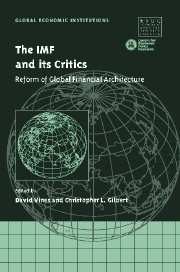Book contents
- Frontmatter
- Contents
- List of figures
- List of tables
- List of contributors
- Acknowledgements
- Introduction
- 1 The IMF and international financial architecture: solvency and liquidity
- 2 Progress towards greater international financial stability
- 3 International coordination of macroeconomic policies: still alive in the new millennium?
- 4 The Report of the International Financial Institution Advisory Commission: comments on the critics
- 5 Reforming the global financial architecture: just tinkering around the edges?
- 6 The IMF and capital account liberalisation
- 7 How should the IMF view capital controls?
- 8 The resolution of international financial crises: an alternative framework
- 9 Whose programme is it? Policy ownership and conditional lending
- 10 The IMF and East Asia: a changing regional financial architecture
- 11 The role of the IMF in developing countries
- 12 Argentina and the Fund: anatomy of a policy failure
- 13 Countries in payments' difficulties: what can the IMF do?
- 14 Accountability, governance and the reform of the IMF
- 15 The IMF at the start of the twenty-first century: what has been learned? On which values can we establish a humanised globalisation?
- Index
15 - The IMF at the start of the twenty-first century: what has been learned? On which values can we establish a humanised globalisation?
Published online by Cambridge University Press: 04 December 2009
- Frontmatter
- Contents
- List of figures
- List of tables
- List of contributors
- Acknowledgements
- Introduction
- 1 The IMF and international financial architecture: solvency and liquidity
- 2 Progress towards greater international financial stability
- 3 International coordination of macroeconomic policies: still alive in the new millennium?
- 4 The Report of the International Financial Institution Advisory Commission: comments on the critics
- 5 Reforming the global financial architecture: just tinkering around the edges?
- 6 The IMF and capital account liberalisation
- 7 How should the IMF view capital controls?
- 8 The resolution of international financial crises: an alternative framework
- 9 Whose programme is it? Policy ownership and conditional lending
- 10 The IMF and East Asia: a changing regional financial architecture
- 11 The role of the IMF in developing countries
- 12 Argentina and the Fund: anatomy of a policy failure
- 13 Countries in payments' difficulties: what can the IMF do?
- 14 Accountability, governance and the reform of the IMF
- 15 The IMF at the start of the twenty-first century: what has been learned? On which values can we establish a humanised globalisation?
- Index
Summary
It is a distinct privilege for me to have been invited by the manager of the Cyril Foster Fund at Oxford University to give this year's lecture.
Of course, the impressive list of my predecessors for the occasion makes me very modest, as I am far from displaying comparable talents and achievements. But I also feel immensely rewarded by what is very peculiar in this invitation: the wish of Mr Cyril Foster that such lectures deal with the ‘elimination of war and the better understanding of the nations of the world’. To devote our thoughts to these two essential objectives of humanity could bring us to the heart of the intense debate we are having now, all around the world, about globalisation. This is a debate about its opportunities, of course, but also its risks, which are so clearly demonstrated by the new breed of economic crises the world suffered during the 1990s, the instability of the world finances, the threat of marginalisation of the most vulnerable and rising inequality.
This debate about globalisation is striking by its intensity and even more by the contrast between the optimism of officials in charge who pretend that their efforts to adapt the system to the new realities should end up by making globalisation an opportunity for all and the total rejection of this view by many protesters in our streets, including here, I suspect.
- Type
- Chapter
- Information
- The IMF and its CriticsReform of Global Financial Architecture, pp. 417 - 432Publisher: Cambridge University PressPrint publication year: 2004
- 1
- Cited by

